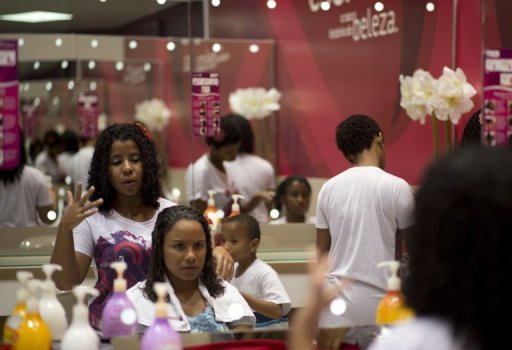
Nothing like a good hairdo to fight deeply entrenched racism in one of the world’s emerging economic giants.
The tools of battle, such as scissors and conditioners, are being wielded on the outskirts of Rio in a chain of beauty parlors that cater to black and mulata women of limited means.
Rather than straighten out their afro-style hair, as many blacks around the world like to do, this chain called Beleza Natural, or natural beauty, transforms it into soft curls. And business is booming.
Ditched is the popular conception in this South American powerhouse that afro-style hair will get you nowhere.
About 51 percent of Brazil’s 194 million people are black or mulato (mixed race), and the owners of Beleza Natural estimate that 70 percent of women in Brazil have afro-style hair.
“This beauty salon is for the forgotten consumer, the invisible one, to raise the self esteem of low-income customers. Women who are used to serving but deserve to be served and served well,” said company chairwoman Leila Velez, a mulata of 38 who at the tender age of 16 was already managing a McDonald’s.
Velez struggled to set up Beleza Natural 20 years ago with relatives. Today she runs its 13 beauty parlors plus a factory that makes hair care products and provides work for 1,700 people.
Every month the plant produces 250 tons of hair care products including the relaxing agent for curling hair. It was created by Velez’s sister-in-law Zica Assis, a former household maid who played around with tropical fruit for 10 years on the porch of her home in a Rio slum to come up with the right formula.
Revenues at Beleza Natural, most of whose outlets are on the outskirts of Rio, have grown at an annual rate of 30 percent over the past eight years, says Velez. She will not talk about profits.
The success is such that buses lined up bumper to bumper and packed with women with afro hair arrive at the salons every Saturday from far away cities.
“One hundred percent of the success of this store is linked to the issue of race,” said Victor Cunha da Almeida, a professor at the business school of the Universidad Federal in Rio de Janeiro.

